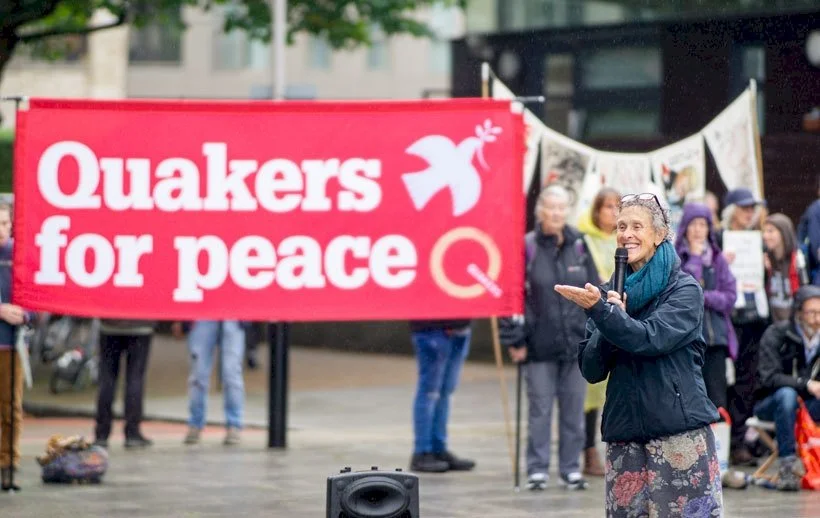Working for Peace
Quakers work locally and internationally to promote peace over conflict and war.
Quakers first issued an anti-war declaration over 350 years ago, in 1660. Here is an extract from it:
All bloody principles and practices we do utterly deny, with all outward wars, and strife, and fightings with outward weapons, for any end, or under any pretence whatsoever.
- Quaker Faith & Practice, 24.04
Then and now, Quakers reject the idea that war is inevitable – we regard it always as evidence of failure. Many Quakers are pacifists, and over the years large numbers of us have been conscientious objectors in times of war.
Conscientious objection is not a total repudiation of force; it is a refusal to surrender moral responsibility for one’s action.
- Kenneth C Barnes, 1987
That might make you think you have to be a pacifist to be a Quaker, but it’s not the case. We don’t tell anyone one what to believe, so Quakers are free to disagree with one another about anything. But it’s definitely true to say that most Quakers agree about the importance of learning and sharing skills to help prevent violence – not just at an international level, but also in our local communities and in our homes. Mediation and peacemaking are skills that can be learned, and the process can start at a young age.
More than thirty-five years ago, Quakers founded Leap Confronting Conflict which works to support young people to manage conflict in their lives by increasing their skills and knowledge. They deliver their work through community and school-based projects, always in local partnerships. They are supported by more than fifty specialist trainers around the UK, many of whom are young people themselves.
The Alternatives to Violence Project (AVP) was started in 1975 by a group of inmates in a New York prison as an experimental workshop in collaboration with local Quakers. It spread throughout the prison system, and eventually into mainstream society. It now consists of a worldwide network of volunteer groups whose goal is to reduce the level of violence in society by providing workshops in which people can learn nonviolent methods of resolving conflict. In Britain, there is an extensive programme of work in schools, prisons and workplaces, as well as weekend workshops for individuals and communities.
Turning the Tide is a Quaker initiative that develops and facilitates workshops and online courses for people wanting to make peaceful changes in their lives. They work closely with other Quaker programmes that focus on nonviolent social change.
At an international level, Quakers maintain offices at the United Nations offices in New York and Geneva. They provide spaces where UN diplomats, staff, and nongovernmental partners can work on difficult issues in a quiet, off-the-record atmosphere out of the public eye. You can find out more by looking at their website.
There are other organisations with Quaker connections that are worth checking out:
Conscience, the peace tax campaign, lobbies for the legal right of conscientious objectors to have the entire military part of their taxes spent on peace building.
The Campaign Against Arms Trade works to end the international trade in arms.
Amnesty International aims ‘to protect people wherever justice, fairness, freedom and truth are denied’.
If you want to explore more of the practical work Quakers do in mediation and peace building, this is a good place to start.
Changing the hardened heart is not achieved by military force or by buying people, it is not achieved by intellectually persuading people; it is achieved by touching them as humans through treating them as valuable.
- George Ellis, 2004
-

What is a Quaker Meeting?
-

Quaker Values
-

Finding Meaning and Purpose
-

Quaker Community
-

Working for Peace
-

Social Action

